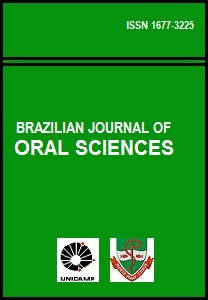Abstract
Aim: The aim of this study was to assess the maximum torsional strength of orthodontic mini-implants of different diameters. Methods: Eighteen mini-implants measuring 10 mm in length were divided into three groups (n = 6). G1, G2 and G3 had miniimplants of 1.2, 1.4, and 1.6 mm in diameter, respectively. Mini-implants manufactured by SIN (Sistema de Implantes, São Paulo, SP, Brazil) were used in all groups. Results: The results showed statistically significant differences (p<0.0001) among the groups. The torsional strength was found to be higher in the mini-implants from the same manufacturer that had greater diameter (G3>G2>G11). Conclusion: Mini-implants with greater diameter should be used if increased torque is needed during orthodontic procedures.The Brazilian Journal of Oral Sciences uses the Creative Commons license (CC), thus preserving the integrity of the articles in an open access environment.
Downloads
Download data is not yet available.

